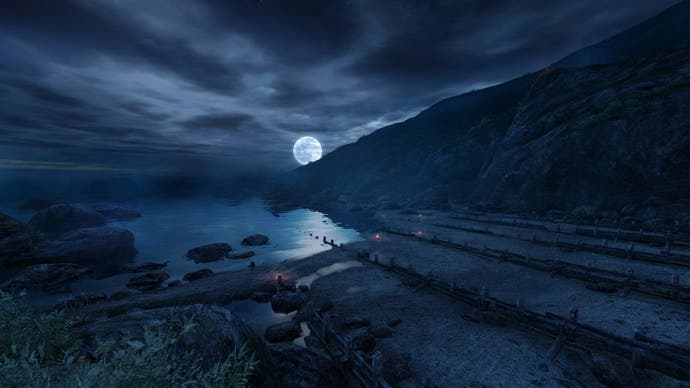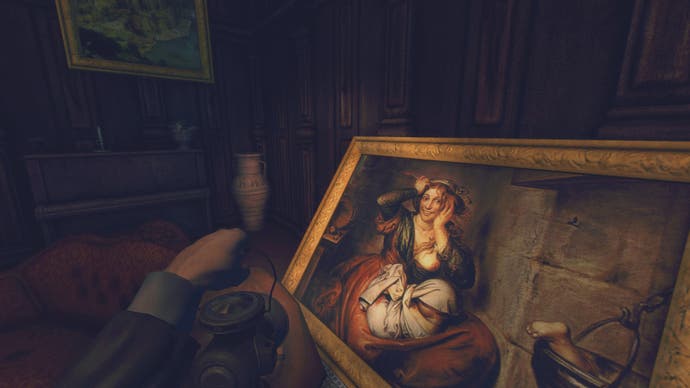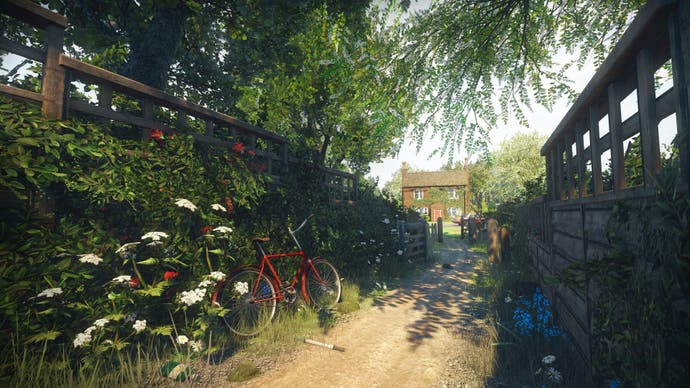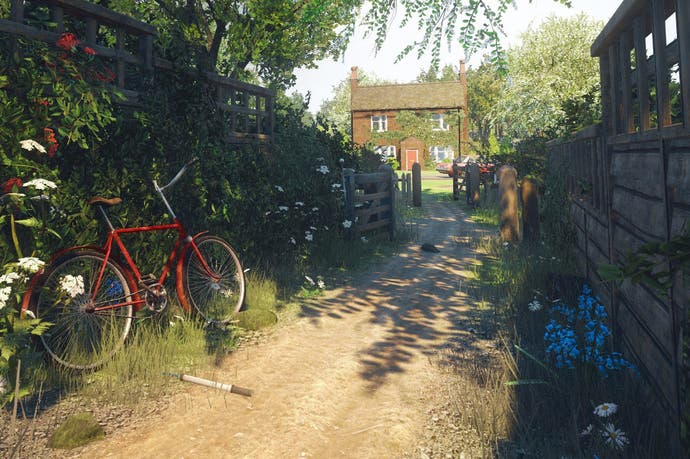The Chinese Room: A look behind Britain's boldest studio
"Never so sure our rapture to create..."
Everybody's Gone to the Rapture's co-director Jessica Curry is not your typical video game developer. Having a background as a film composer is one detail that sets her apart from the pack, but what's probably more important is that she's co-directed three successful commercial games without being a gamer herself. How did this happen?
It all began 15 years ago when a snafu with an arts organisation mucked up one of her bookings, and she had the situation resolved by a young upstart at the company named Dan Pinchbeck. Little did either of them know that this would result in a 15-years-and-counting relationship and the birth of both a son and a video game studio.
That final bit was never part of the plan.
Prior to the creation of video game development studio The Chinese Room, the two collaborated on an art walk, in which visitors would stroll around an installation listening to a 25-minute piece of music that was played through their headphones: a public space and a private, intimate soundtrack, with everyone on their own unique timeline.
Curry composed the track while Pinchbeck wrote the words. "Jess' work has always been about the relationship between music and space," Pinchbeck says of his wife over a Skype call. "Jess always said the idea behind it was to write the soundtrack for a film that didn't exist. If you were inspired to look at something a little bit more closely while it was playing you'd have one experience, while if you walked around a different way you'd have another.
"Weirdly now, talking about it, it pretty much describes Dear Esther," Pinchbeck realises. "We just had a real space rather than a virtual one."

It wasn't much later that Pinchbeck, who'd since become a researcher at University of Portsmouth, decided to develop the original Dear Esther (a free mod for Half-Life 2) as a project while attaining a Ph.D in "story as gameplay". Curry was freelancing in film and since the two worked so swimmingly together on the art walk, it seemed only natural for her to compose the soundtrack for Esther. Given the game's humble beginnings as a research project, neither party involved in its creation expected this glorified homework assignment to make any waves.
"We put it on Modd DB and it did so well, with over 100k downloads," Curry reminisces. "One of the people who played it was Rob Briscoe [the artist behind Mirror's Edge] and he said 'I think you've got something here. It sounds great and it's a great story, but it could look a hell of a lot better."
Curry and Pinchbeck were more than happy to bring Briscoe on board as a collaborator for a remake, but even then neither party expected it to make much in the way of money. The goal was simply to break even with the capital the Indie Fund had given the trio to complete the project.
"It wasn't even a decision to commercialise it. It wasn't even to sell it," Pinchbeck says. "It was to enable us to do the soundtrack and there's no way we could have gotten the Source license and actually paid Valve... So initially commercialising it was more about 'we want people to play this.' I don't think either of us ever anticipated that it was going to be the runaway success that it was. We were just hoping we'd make our costs back really."
"That was the strange thing; watching those figures leaping up every second on Steam," Curry recalls. "We looked at each other and thought, 'I think we might be running a games company!'"
Indeed the money began piling up and the press came pouring in, yet neither Pinchbeck nor Curry were set on quitting their day jobs to focus on game development full-time. What if Esther were to end up a fluke? They do have a child, after all.
Thankfully, Pinchbeck and Curry didn't have to wait terribly long before an offer came in from Frictional Games, the studio behind the first-person horror classic Amnesia: The Dark Descent. Frictional wanted The Chinese Room to make a sequel to its cult curio and the fledgling studio was more than happy to oblige.

What people don't know is that when The Chinese Room made Amnesia: A Machine for Pigs, they still had day jobs. Pinchbeck was still working at the university, though he was on sabbatical. The rest of the Pigs team Pinchbeck assembled from researchers at the university after he convinced the faculty that creating a commercial horror game would be more productive than any internal academic project.
Amazingly, this wasn't that hard a sell as the game's co-designer Peter Howell was seeking a Ph.D researching "the disruption of player expectation and learned schema within Horror games," according to his LinkedIn. "We really wanted his Ph.D to be about a commercial product," Pinchbeck says.
As such, the university paid for everyone's living expenses and received a cut for administering the project. "We used The Chinese Room as a brand, but it wasn't really a company. Everyone was employed through the university right through to the end of Pigs," Pinchbeck explains. "We only stopped when we handed Pigs over to Frictional in January 2013, and in February we started pre-production on Rapture."
Pinchbeck and Curry were negotiating with Sony on a future project while Pigs was still development. "The plan always was if it did work out with Sony we'd move out and take the jump and quit the day job," Pinchbeck says. "It wasn't really a plan. It just sort of happened."
It was only at this point, once Pigs wrapped up, that The Chinese Room became more than an intimate trio toiling away on a passion project or a ragtag group of academics pooling their work, and transformed into a fully independent game studio with its own office. Ah, game studios: they grow up so fast!

This was great news for Pinchbeck, obviously, as he was the one getting a Ph.D in game studies. He may be an academic, but he's also a fairly traditional gamer who loves first-person shooters and even wrote an entire book about his admiration of Doom. For Curry, however, this was a much riskier move, jumping into a medium she only had a smattering of familiarity with. That naivety might sound like a curse, but in actuality it gives her a refreshing, albeit critical, perspective.
"Jess is really good at making me stop and saying 'you don't always include that stuff because that's the way it's always been done," Pinchbeck says. "If stuff is going to be included, everything has to earn its place. And when you really start looking at that, I think there's a lot of things we do in games out of habit and out of expectation."
As such, Curry seems somewhat proud of her distance from the bulk of video game culture. "My mum left school at 15 and then she became a writer and she always said that she wrote a play before she ever read one," she says. "I'm not advocating ignorance as a creative strategy, but sometimes I think it's really good to not be frightened of conventions because you're not so well versed in them. Actually, it can be really, really freeing."
Nowhere is this more apparent than in Rapture's audacious Trophy list. Typically games of this ilk encourage players to find everything. It's that "gotta catch 'em all" mentality the medium has long exhibited before Pokémon came along and elegantly distilled it into a single phrase. While Rapture does have a Trophy for uncovering all the game's content, it also has one for unearthing very little of the story prior to the conclusion. Entitled "Open-Ended," it's a confident reminder that there's no wrong way to play.
Pinchbeck believes Curry's training in film combined with her distance from games allows her to think about her musical compositions in a different way too. "You could take a lot of the text out of Pigs and I think the soundtrack still very powerfully communicates the underlying story," he suggests. "And that isn't a game composer's perspective on anything. That comes from a film composer and an art composer's perspective of what music can do in an interactive space.
"I think we definitely gravitated towards people who have a very. very wide frame of cultural reference," Curry continues. "It brings something very, very strong to the studio, I think. People are talking about books and concerts they've been to and walks they've been on, things that they see, outings that they've had with their children. And I really, really like that. Obviously everyone's really passionate about games - apart from me - but we talk about a lot of other things and I think we draw a lot of inspiration from the world outside. Books especially."
The Chinese Room's appreciation of literature certainly shows in the final product. Rapture not only contains a lot of books in its eerie '80s apocalypse, but it learns some important lessons from them: notably that sometimes it's what you don't see that's most engaging. Daringly, The Chinese room populated Rapture's entire cast with ghostly silhouettes. Things like race, age, and physical features are left entirely up to the player to fill in.

There are times when Curry's distance from gaming can feel like a burden to her though. She's an extraordinarily detail-oriented person which means that games, with all their technical and artistic conundrums wrestling for balance across multiple disciplines, require at least some degree of compromise.
"You said before that you're a pain in the ass and James [Watt, senior VFX artist] said 'no, you're quality control,'" Pinchbeck tells her. "I think that's really true. I spit out like a thousand ideas on hour and then Jess just stops, pauses, and comes out with one good one."
Curry is equally appreciative of her husband's distinct talents. "I think Dan is an ideas machine. He's like the terminator of ideas," Curry says of this strange union. "I often describe myself as Dan's editor. He's an exceptionally smart man with many ideas, some of which are very poor."
Pinchbeck totally agrees with this assessment. After all, he initially wanted Everybody's Gone to the Rapture to be saddled with a Majora's Mask-esque time limit before realising that would have been incredibly detrimental to the experience.
"I'm such a perfectionist that if I made a game, or ran a game company by myself, it would never get finished," Curry says. "But if Dan ran a game company by himself, his games would be shit."
"Oh that's so true!" Pinchbeck agrees before clarifying "They wouldn't be shit; they just wouldn't work. They'd be so full of bugs. I'd be like 'yeah, it'll be alright.' And Jess would be like 'no, it won't be alright. You've got to fix it.'"
That's the key, really. Curry and Pinchbeck have vastly different skill sets, attitudes, backgrounds, and tastes in games, but they complement each other exceptionally well. With Pinchbeck's frenetic mind and conservative gamer impulses matched by Curry's methodical perfectionism, The Chinese Room generates its own unique flavour of kooky class.
"Having that combination between very, very games-driven and very, very exterior to games-driven, I think there's a balance that works really well there, because we don't settle," Pinchbeck states. "As Jess always says, 'anything less than excellence is pointless.' And I think that has a lot to do with why we get the games we get."

